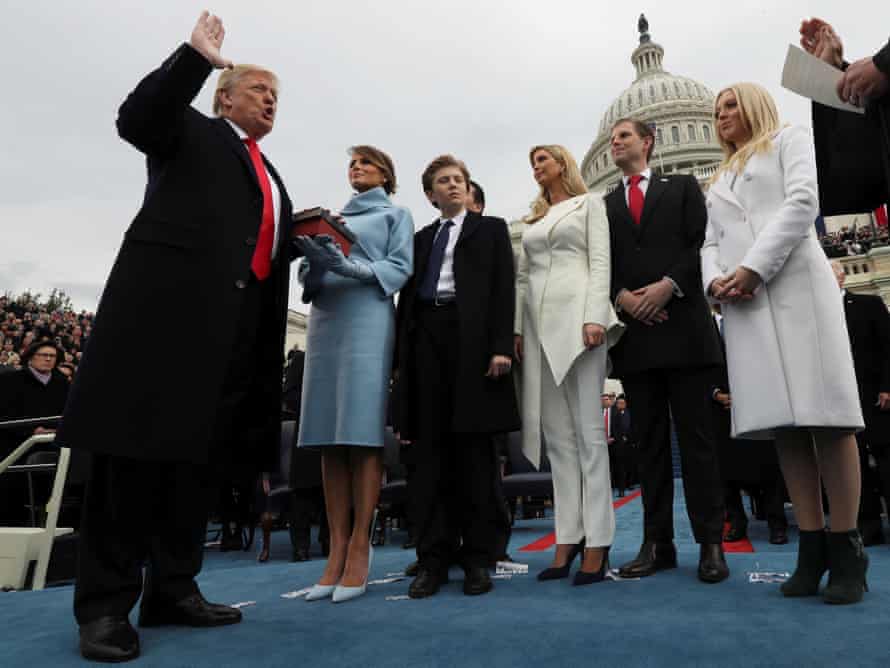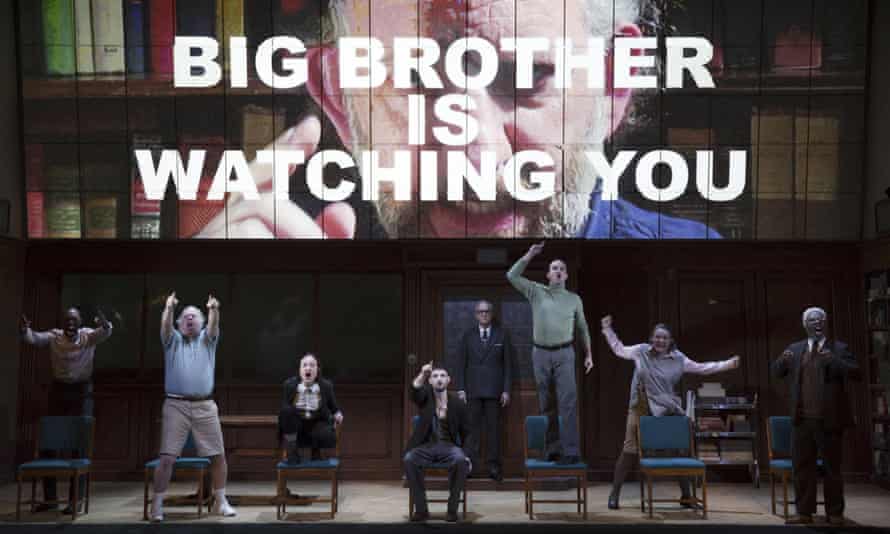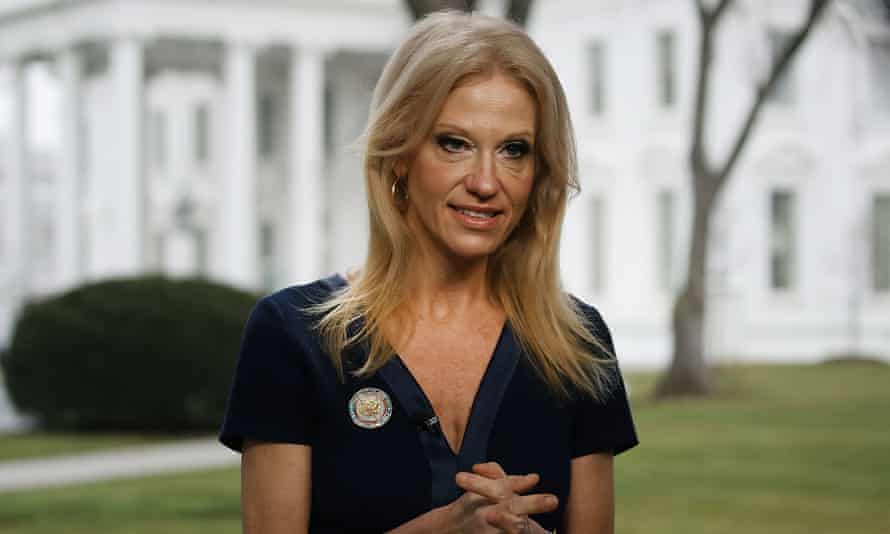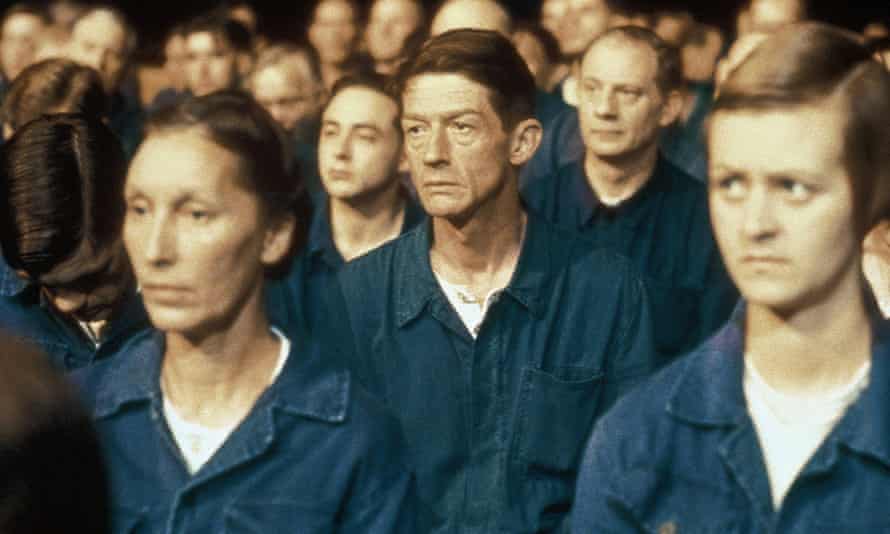What Does Fake Orwell Fiction Again Mean?
December 1948. A man sits at a typewriter, in bed, on a remote isle, fighting to complete the book that means more than to him than any other. He is terribly ill. The book volition be finished and, a year or and so subsequently, so will the human being.
January 2017. Another man stands before a crowd, which is not equally large as he would like, in Washington DC, taking the oath of office as the 45th president of the United States of America. His press secretary says that it was the "largest audience to ever witness an inauguration – period – both in person and around the world". Asked to justify such a preposterous lie, the president's adviser describes the statement as "alternative facts". Over the next iv days, US sales of the dead man's book will rocket by nearly 10,000%, making it a No 1 bestseller.
When George Orwell'southward Xix Eighty-Four was published in the United Kingdom on 8 June 1949, in the eye of the 20th century, i critic wondered how such a timely book could perchance exert the same ability over generations to come up. Thirty-five years subsequently, when the present defenseless up with Orwell'southward future and the world was non the nightmare he had described, commentators again predicted that its popularity would wane. Another 35 years have elapsed since then, and Nineteen Eighty-Four remains the volume we turn to when truth is mutilated, when language is distorted, when power is abused, when we desire to know how bad things can become. Information technology is nevertheless, in the words of Anthony Burgess, author of A Clockwork Orange, "an apocalyptical codex of our worst fears".
Nineteen Fourscore-Four has not just sold tens of millions of copies – information technology has infiltrated the consciousness of countless people who accept never read it. The phrases and concepts that Orwell minted have get essential fixtures of political language, withal potent after decades of use and misuse: newspeak, Big Brother, the thought police force, Room 101, the two minutes' detest, doublethink, unperson, retention pigsty, telescreen, 2+2=v and the ministry of truth. Its championship came to define a calendar yr, while the discussion Orwellian has turned the author's own proper name into a capacious synonym for everything he hated and feared.
It has been adapted for movie theatre, television, radio, theatre, opera and ballet and has influenced novels, films, plays, television shows, comic books, albums, advertisements, speeches, election campaigns and uprisings. People accept spent years in jail just for reading it. No work of literary fiction from the past century approaches its cultural ubiquity while retaining its weight. Dissenting voices such equally Milan Kundera and Harold Bloom have argued that Nineteen 80-Four is actually a bad novel, with thin characters, humdrum prose and an implausible plot, but even they couldn't gainsay its importance.
A novel that has been claimed past socialists, conservatives, anarchists, liberals, Catholics and libertarians of every description cannot be, as Kundera alleged, but "political thought bearded as a novel". Orwell's famously translucent prose conceals a earth of complexity. Normally thought of as a dystopia, Xix Eighty-4 is also, to varying and debatable degrees, a satire, a prophecy, a alarm, a political thesis, a work of science fiction, a spy thriller, a psychological horror, a gothic nightmare, a postmodern text and a beloved story. Well-nigh people read it when they're young and experience hobbling by information technology – it offers more suffering and less reassurance than any other standard high-schoolhouse text – only don't experience compelled to rediscover it in machismo. That's a shame. It is far richer and stranger than you remember.

Orwell felt that he lived in cursed times. He fantasised almost some other life in which he could take spent his days gardening and writing fiction instead of being "forced into becoming a pamphleteer", but that would have been a waste product. His existent talent was for analysing and explaining a tumultuous period in human history. Written down, his cadre values might seem too vague to carry much weight – honesty, decency, liberty, justice – but no one else wrestled and so tirelessly, in private and in public, with what those ideas meant during the darkest days of the 20th century. He always tried to tell the truth and admired anyone who did likewise. Nothing built on a lie, nevertheless seductively convenient, could have value. Key to his honesty was his commitment to constantly working out what he thought and why he thought information technology and never ceasing to reassess those opinions. To quote Christopher Hitchens, 1 of Orwell's most eloquent admirers: "Information technology matters not what you remember, just how yous recall."
I first encountered Nineteen Eighty-Four as a teenager in suburban southward London. As Orwell said, the books you read when you lot're young stay with you for ever. I institute it shocking and compelling, simply this was circa 1990, when communism and apartheid were on the way out, optimism reigned and the world didn't feel particularly Orwellian. Even after 9/11, the book'south relevance was fragmentary: it was applied to political language, or the media, or surveillance, but not the whole motion picture. Democracy was on the ascension and the cyberspace was largely considered a force for proficient.
In 2016, the globe changed. Every bit Trump took the White House, Britain voted for Brexit and populism swept beyond Europe, people took to talking anxiously about the upheavals of the 1970s and, worse, the 1930s. Bookshop shelves began filling upwards with titles such as How Democracy Ends, The Road to Unfreedom and The Death of Truth, many of which quoted Orwell. Hannah Arendt'southward The Origins of Totalitarianism merited a new edition, pitched equally "a nonfiction bookend to 19 Fourscore-Four". So did Sinclair Lewis'due south 1935 novel about American fascism, It Can't Happen Here. Hulu's adaptation of Margaret Atwood's The Handmaid'due south Tale was as alarming as a documentary. "I was asleep before," said Elisabeth Moss's character, Offred. "That's how nosotros let it happen." Well, we weren't asleep any more. I was reminded of something Orwell wrote about fascism in 1936: "If you pretend that it is merely an aberration which volition before long pass off of its own accordance, yous are dreaming a dream from which yous will awake when somebody coshes yous with a rubber truncheon." Nineteen Eighty-4 is a book designed to wake you up.
It was the first dystopian novel to be written in the knowledge that dystopia was real. In Federal republic of germany and the Soviet bloc, men had built information technology and forced other men and women to live and die within its iron borders. Those regimes are gone but Orwell's volume continues to define our nightmares, even equally they shift and change. "For me, it's like a Greek myth, to take and do with it what you will – to examine yourself," Michael Radford, the director of the 1984 movie adaptation, told me. "It'southward a mirror," says a character in the 2013 stage version. "Every historic period sees itself reflected." For vocalizer-songwriter Billy Bragg: "Every time I read it, it seems to be nearly something else."
After President Trump's adviser Kellyanne Conway first used the phrase "alternative facts" on 22 January 2017, The Hollywood Reporter called Nineteen Fourscore-Four "the hottest literary property in boondocks". Scores of cinemas across the US appear that they would be screening Michael Radford'southward 1984 on 4 April, because "the clock is already hit 13". And theatre producers Sonia Friedman and Scott Rudin asked British playwrights Robert Icke and Duncan Macmillan to transfer their hit play 1984 to Broadway as soon as possible. "It went from cypher to a hundred in the infinite of 5 days," Icke told me. "They said, 'We think information technology's important this play is on Broadway at present.'"

When the play was in the West Cease, each of its 3 runs inhabited a dissimilar political context – the tertiary opened during the Brexit referendum, only before the murder of Jo Cox MP by a far-right terrorist. During the run at New York's Hudson theatre, which began on eighteen May 2017, the directors noticed that the audience's reaction each night was affected by any Donald Trump had done that day. The night later on Trump tweeted the nonsense discussion covfefe, there was such a desire for humour that one actor was distraught: "I've been in comedies that have had less laughter than this." On another nighttime, the news was and so bad that people passed out. At a third performance, when Winston Smith's chief antagonist O'Brien asked: "What year is it?", a woman shouted: "It's 2017 and this is fucked up!"
It must exist said that Trump is no Big Brother. Nor, despite his revival of such toxic phrases every bit "America Beginning" and "enemy of the people", is he just a throwback to the 1930s. He has the cruelty and power hunger of a dictator but not the subject field, intellect or ideology. His closest fictional precursor is probably Buzz Windrip, the oafish populist from It Can't Happen Hither. In the real earth, Trump's forefather is Joseph McCarthy, who displayed comparable levels of narcissism, dishonesty, resentment and rough ambition and an uncanny ability to make journalists trip the light fantastic to his tune even every bit they loathed him. Nevertheless, Orwell would take recognised the type. "I think Dad would've been tickled by Donald Trump in an ironic sort of way," said Orwell'due south son, Richard Blair, in 2017. "He may have thought, 'There goes the sort of man I wrote about all those years ago.'"
At that place are precedents in Orwell's writing. During Trump's campaign confronting Hillary Clinton, it was hard to scout the candidate whipping supporters into a cry of "Lock her upward!" without being reminded of the two minutes' hate. The president also meets near of the criteria of Orwell'south 1944 definition of fascism: "Something cruel, unscrupulous, arrogant, obscurantist, anti-liberal and anti-working-class… about any English person would accept 'bully' as a synonym for 'fascist'." Orwell contended that such men can only rise to the acme when the status quo has failed to satisfy citizens' need for justice, freedom and self-worth, but Trump'due south victory required one more crucial ingredient.
He did not seize power through a revolution or coup. He was not potentiated past a recession or a terrorist atrocity, permit alone a nuclear state of war or a fertility crisis. His road to the White Firm passed through America's ain "Versionland", which is Russia expert Luke Harding's proper noun for the post-truth politics of Vladimir Putin's Russia. In Versionland, flagrant lies become "culling facts". Trump creates his own reality and measures his ability by the number of people who subscribe to information technology: the cruder the lie, the more power its success demonstrates. Information technology is truly Orwellian that the phrase "fake news" has been turned on its head by Trump and his beau authoritarians to describe real news that is not to their liking. Trump's lawyer Rudy Giuliani accidentally provided a rough motto for Versionland Us when he snapped at an interviewer: "Truth isn't truth!" In the words of O'Brien, reality is inside the skull.

How did this happen? On the eve of 1984, the science-fiction writer Marta Randall argued that one thing Orwell didn't predict was the spread of cynicism: "It would be very hard for 'Large Blood brother' to convince anyone of anything post-Watergate and mail service-Vietnam." In the 1980s, she suggested, Orwell'due south target would accept been the trivialisation of the news media. "We may quit relying on 'administrative' news stories entirely." Over time, this distrust of establishment narratives led many people to seek the truth merely many others to cull their own "truths". Combining cynicism with credulity, people who were proudly sceptical of CNN or the New York Times were perfectly happy to have unsourced Facebook posts and quack science at face value. Social media fabricated this process all too easy. Facebook's old master of security, Alex Stamos, pointed out that using the blunt instrument to eliminate fake news could plow the platform into "the ministry building of truth with ML [machine-learning] systems", but by failing to human action in fourth dimension, Facebook was already allowing "bad actors" such as Russia'due south Net Inquiry Agency to spread disinformation unchecked.
The problem is probable to get worse. The growth of "deep fake" image synthesis, which combines reckoner graphics and artificial intelligence to manufacture images whose artificiality can only be identified by expert assay, has the potential to create a paranoid labyrinth in which, according to the viewer'due south bias, faux images will pass as existent, while real ones are dismissed every bit fake.
During a speech communication in July 2018, Trump said: "What you're seeing and what you're reading is not what's happening." A line from Nineteen Eighty-Four went viral: "The party told you to pass up the testify of your eyes and ears. It was their final, about essential control."

Ane might feel wistful for the days when Big Brother was a joke and Orwell had "won", as many commentators idea after the fall of the Berlin Wall. An era plagued past far-right populism, authoritarian nationalism, rampant disinformation and waning faith in liberal democracy is not one in which 19 Eighty-Iv can be easily dismissed.
Orwell was both too pessimistic and not pessimistic plenty. On the one hand, the west did not succumb to totalitarianism. Consumerism, not endless war, became the engine of the global economy. Only he did not appreciate the tenacity of racism and religious extremism. Nor did he foresee that the common man and woman would cover doublethink as enthusiastically as the intellectuals and, without the need for terror or torture, would cull to believe that two plus two was whatever they wanted information technology to be.
Nineteen Lxxx-4 is about many things and its readers' concerns dictate which i is paramount at whatsoever indicate in history. During the cold war, information technology was a volume about totalitarianism. In the 1980s, it became a alert about technology. Today, it is near of all a defence of truth.
Orwell's fear, incubated during the months he spent fighting in the Spanish ceremonious war, that "the very concept of objective truth is fading out of the world" is the night centre of Nineteen Eighty-Four. It gripped him long before he came up with Big Brother, Oceania, newspeak or the telescreen, and it's more important than any of them. In its original 1949 review, Life correctly identified the essence of Orwell'due south message: "If men continue to believe in such facts as can be tested and to reverence the spirit of truth in seeking greater knowledge, they can never be fully enslaved." Seventy years later, that feels similar a very big if.
Source: https://www.theguardian.com/books/2019/may/19/legacy-george-orwell-nineteen-eighty-four
0 Response to "What Does Fake Orwell Fiction Again Mean?"
Post a Comment